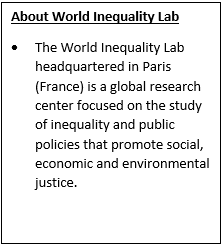SYLLABUS
GS-3: Conservation, environmental pollution and degradation, environmental impact assessment.
Context: Recently, the World Inequality Lab published the Climate Inequality Report 2025 highlighting how extreme wealth concentration is directly accelerating the climate crisis through capital ownership and unequal emissions.
More on the News
• It warns that climate change may further widen the global wealth gap if ownership of low-carbon assets remains concentrated among the rich.

• It states that the carbon budget for limiting warming to 1.5°C may be exhausted within the next three years.
Key Highlights of the Report
• Climate crisis fueled by Wealthy Individuals: The top 1 percent cause 15 percent of global emissions based on consumption and 41 percent of emissions based on private capital ownership.
Emission Inequality: The per capita emissions of an individual in the global top 1 percent are around 75 times higher than someone in the bottom 50 percent under a consumption-based approach.
- The emission gap rises to nearly 680 times when calculated through an ownership-based approach.
- Industrial Emission: The report noteed that 100 companies are responsible for 71 percent of industrial greenhouse gas emissions since the Industrial Revolution.The report highlighted that more than 200 new oil and gas projects and over 850 coal mines are still being approved worldwide despite the Paris Agreement.
• Wealth Inequality: Climate change can deepen wealth inequality as the share of wealth held by the global top 1 per cent could increase to 46 per cent in 2050 from 38.5 per cent at present if those individuals were to make and own all necessary climate investments in the next decades.
• Vulnerability Inequality: It cautions that climate change can deepen inequality as the poorest remain most exposed to climate damage and have the least capacity to adapt.
• Key recommendations:
- Proposed a financial investment tax on the carbon content of assets which may help redirect capital flows away from high-carbon assets, especially in the absence of an outright ban on high-carbon investments.
- Global ban on new fossil fuel investments and major public investment in low-carbon infrastructure.
Proposed a carbon-adjusted tax on wealth and investments, with the double goal of discouraging high-carbon investments and financing the green transition in a progressive manner.
UPSC Mains Practice Question
The Climate Inequality Report 2025 argues that the climate crisis is not only an environmental issue but also a structural outcome of global wealth concentration. Discuss how wealth ownership patterns influence emissions and assess the policy recommendations made in the report to address this inequality.

